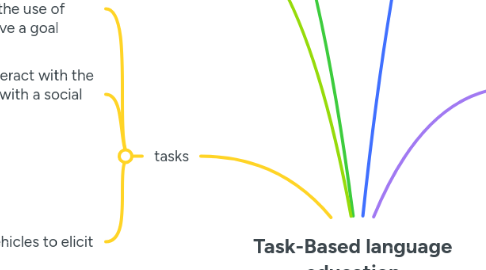Task-Based language education
by Letícia Carvalho


1. considers the student
1.1. their learning contexts
1.2. their experiences
1.3. their autonomy
2. seeks to prepare the student for real-world challenges
2.1. non-linguistic purposes
3. tasks
3.1. are actions that people perform daily that require the use of language to achieve a goal
3.2. are an invitation to interact with the world using language with a social purpose
3.2.1. tasks with clear communication purposes and an interlocutor
3.3. are used as vehicles to elicit
3.3.1. language production
3.3.2. interaction
3.3.3. negotiation of meaning
3.3.4. processing of input and focus on form
4. methodology for the elaboration of the didactic sequence
4.1. delimitation of the theme to be worked on according to the learning objectives established in the curriculum for which the sequence is being produced
4.2. definition of the discursive genre of the production from which the sequence of tasks will result
4.3. selection of genres and structuring texts for the mobilization of relevant knowledge for the realization of the final product
4.4. planning the types of tasks to be carried out and their sequence for working with the selected texts
4.5. elaboration of tasks
5. recognizes
5.1. language as a fundamental element of social interactions
6. task design principles
6.1. the topic must be culturally relevant and suitable for the group of students
6.2. the structuring discursive genres chosen must be consistent with the theme
6.3. the selected texts must be authentic and representative of the social practices that circulate in the thematic
6.4. the task should offer opportunities to use the language and promote reflections on its use
6.5. the order and wording of tasks should be organized to provide scaf-folding
6.6. the tasks should stimulate relevant interactions between students and texts, students and students, and students and teacher
6.7. the task accomplishment should provide opportunities for meaningful learning and achieving outcomes beyond the classroom
7. basic questions
7.1. what particular language learning goals need to be reached by the learner?
7.2. how can educational activities be designed and organized in order to stimulate and support learners into reaching these language learning goals?
7.3. how will the students' learning processes and outcomes be assessed and followed up?
8. assessment of students' language proficiency
8.1. most direct way
8.1.1. to assess the extent to which they are able to perform the target tasks or, for the same matter, intermediate tasks ('assessment tasks')
